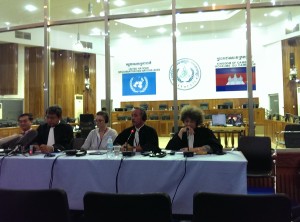Press Conferences Detail Triumphs, Defeats, and Plans in the Aftermath of Case 002/01
As the public gallery emptied onto the front steps of the Extraordinary Chambers in the Courts of Cambodia on Thursday morning, following the reading of the Judgment in case 002/01, attendees were met by throngs of press seeking their reaction to the guilty verdicts and life sentences given to defendants Nuon Chea and Khieu Samphan. More than twenty camera teams competed for the perspective of the Cambodian public and others present from around the world.
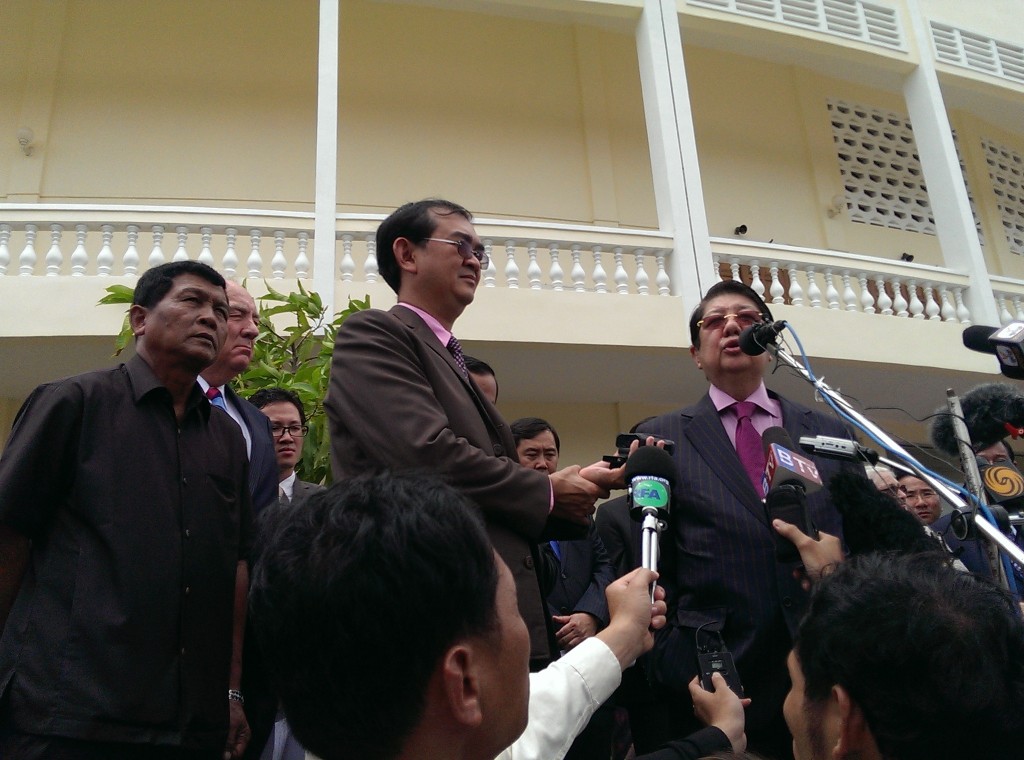 At the same time, the first of two more formal press conferences was set to begin further north, along the curved profile of the court’s exterior. Sok An, Deputy Prime Minister of Cambodia, and his government’s liaison to the ECCC appeared alongside David Scheffer, the UN Secretary General’s Special Expert on United Nations Assistance, and Stephen Rapp, US Ambassador-at-Large for War Crimes.
At the same time, the first of two more formal press conferences was set to begin further north, along the curved profile of the court’s exterior. Sok An, Deputy Prime Minister of Cambodia, and his government’s liaison to the ECCC appeared alongside David Scheffer, the UN Secretary General’s Special Expert on United Nations Assistance, and Stephen Rapp, US Ambassador-at-Large for War Crimes.
Sok An spoke first, expressing his pleasure with the verdict and commenting that the long process leading to it “had never lost sight of justice”. He pointed to the historic importance of the verdict, explaining that it illustrated the court’s capacity to perform its duties while still upholding international fair trial and due process standards.
The Deputy Prime Minister had more praise for the ECCC, which he called a “new type of court in the annals of international justice”, pointing to the national nature of the court that has been bolstered by the participation and cooperation of the international community, and particularly the UN. He went on to report the unprecedented civil party participation as well as the large number of Cambodian citizens who were able to watch the trial before thanking all parties for their participation and support.
The Deputy Prime Minister then took a few questions. The first asked for his reaction to the verdict. Sok An said that he, personally, was contented by the judgment and sentence and noted “we’ve come a long way” and that the court was moving in the right direction. He said that today’s judgment is a testament to the success of the tribunal and its competence.
Asked about the challenges of the court, the Deputy Prime Minister explained that those that still existed had been clear from the beginning – namely the age and health of the accused and the funding of the court. He went on to discuss the financial outlays of the court, stating that the $25-27 million US dollars spent per year was only about 25% of the annual budget of the other international criminal tribunals. He then thanked UN Secretary General Ban Ki Moon and Special Expert David Scheffer for continuing to raise the money that made the voluntarily funded court possible.
Asked the hard question, whether cases 003 and 004 would ever commence, Sok An declined to answer. He said only that the verdict today was a triumph and it was not the time to discuss future cases but to celebrate this one.
Special Expert David Scheffer spoke next, thanking Sok An and acknowledging Ambassador Stephen Rapp. Starting his statement with the remark that “Today, the winds of international justice swept though the fields, forests, and towns of Cambodia where millions perished.” Special Expert Scheffer went on to warn that the trial chamber’s conviction was still appealable, reflecting the high due process and fair trial standards of the court. The case, he reminded the press, had considered “huge crimes” and its progress and ultimate success underlined the importance of UN 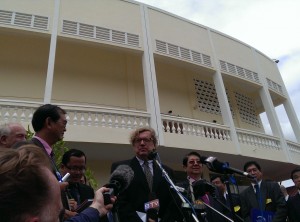 involvement as well as the support of a “large and growing number of countries” for the ECCC’s mission.
involvement as well as the support of a “large and growing number of countries” for the ECCC’s mission.
Focusing particularly on the voluntary financial support these countries have provided, he lauded the stabilization of the court’s finances and said that with the gains made in this category “Work will continue, the mandate will be achieved.” Thanking a long list of donor countries including: Japan, the US, Australia, the UK, Sweden, Norway, Denmark, Germany, France and many more, and announcing that the court would soon have its first donor country from Latin America. Additionally, the European Union is an important donor. He also made special mention of the Cambodian government’s new commitment to fund it’s portion of the court’s cost, pointing out the importance of that development.
Special Expert Scheffer continued:
“I have been at this for 18 years and I woke up every morning to doubters that said we would never reach this day. We have reached it and we will continue.”
He then mentioned the court’s historic recognition of the Civil Parties and victims made by incorporating their testimony into the substance of that judgment, saying that this was a “great leap forward for international justice” before ceding the microphone to Ambassador Stephen Rapp.
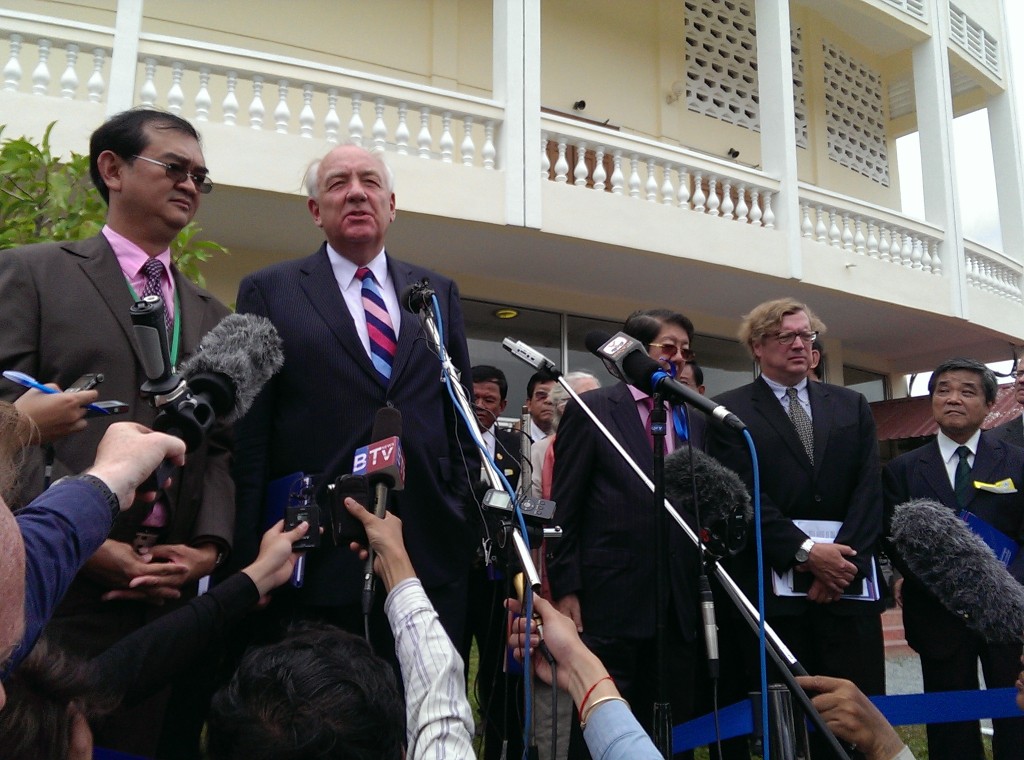 Ambassador Rapp stated that the importance of the ECCC must be recognized on three levels. First, for the victims and the survivors, he said, the testimony that was repeated today recognized the death and suffering that they had endured. Second, it is important for the country of Cambodia, he said, particularly the young people because it provides an important lesson about their country’s recent history. Finally, he said, this trial is important to the world. “Why bring such old people to trial?” he asked. Because holding everyone accountable for their crimes sends a message, he said. So that anyone in a position of committing such crimes would know that “Their day of judgment will arrive. There is no escaping it in this life.”
Ambassador Rapp stated that the importance of the ECCC must be recognized on three levels. First, for the victims and the survivors, he said, the testimony that was repeated today recognized the death and suffering that they had endured. Second, it is important for the country of Cambodia, he said, particularly the young people because it provides an important lesson about their country’s recent history. Finally, he said, this trial is important to the world. “Why bring such old people to trial?” he asked. Because holding everyone accountable for their crimes sends a message, he said. So that anyone in a position of committing such crimes would know that “Their day of judgment will arrive. There is no escaping it in this life.”
With one press conferenced ending, the journalists began filtering back into the public gallery of the court to attend the next, during which each party’s team of lawyers would have 20 minutes to give statements and answer questions. After a brief introduction by Mr. Lars Olsen and Mr. Dim Sovannarom, two of the chief media liaisons for the ECCCC, the press conference began with Co-Prosecutors Chea Leang and Nicholas Koumjian.
National Co-Prosecutor Ms. Chea Leang spoke first, noting that it had been a long wait for this judgment. She went on to say that it represented an important milestone for the people of Cambodia and victims worldwide, especially after 35 years of evasion of justice by the leaders of the Khmer Rouge for some of the most terrible and heinous crimes ever committed. She said that the judgment properly recognized the responsibility of the accused and that the sentence was the only appropriate penalty for their crimes. She concluded by recognizing the participation of the Civil Parties and the attendance of the public, saying that the process had been good for Cambodia, the rule of law and democracy. “The victims finally have some justice,” she said.
International Co-Prosecutor Nicholas Koumjian followed briefly by recalling the testimony of a Civil Party who had appeared before the court and testified about how twenty-two members of her family had perished under the Khmer Rouge. She had spoken about how this trial was her opportunity to finally find justice and had asked the court to find fairness and justice by giving a sentence in proportion to the gravity of the crimes. Mr. Koumjian then stated emphatically “This court has found fairly and justly and has given a sentence that is in proportion to the gravity of these crimes.”
A series of questions was then taken by the panel. 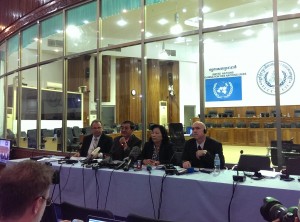
The first questioner asked for a comparison of this sentence with the Case 001 sentence for Duch, the head of the notorious Security Prison 21. The questioner also asked about the necessity of a second trial and the corresponding cost.
Ms. Chea Leang spoke to this question, saying that, while the initial sentence given to Duch was 35 years, later increased by the Supreme Court Chamber to life, he was a relatively low level figure in the regime compared to the defendants in this case. She stated it should not be hard to see how the most responsible people in a regime that committed such crimes should get a life sentence and that the gravity and the cruelty of the crimes mattered greatly. She then said that a second trail is necessary because the verdict for the first trial is not yet enforceable, it is pending appeal and therefore the outcome cannot be foreseen. Additionally it is not a waste of time and money because it is part of the greater quest for justice.
When asked about any potential difference in liability between the two defendants Ms. Leang stated that, despite the fact that Khieu Samphan was found only to be one of two members of office 870, and not the “Director” as had been alleged, this was just a small part of the case and he still bore vast responsibility, comparable to that of Nuon Chea.
Mr. Koumjian addressed a question about Cases 3 and 4 quickly and stated that the investigations are ongoing and his ability to comment is limited. He assured the press that they would proceed accordingly.
He then also addressed the question about comparative liability, saying that in the case of many war crimes cases, the vast crimes committed are hard to compare. Still, she repeated that in this case the “sentence is in proportion to the gravity of these crimes.”
A questioner inquired as to where the parties would be held now that the Trial Chamber had convicted them. Mr. Koumjian explained that the sentence was not yet enforceable. She went on to note that the defendants still had 30 days to appeal and that they would be held at the ECCC until the appeal was decided on, at which point the sentence could become enforceable.
With that the Co-Prosecutors left the room, along with their team, and the Co-Lawyers for Nuon Chea took their place at the table.
Mr. Viktor Koppe stated that he was very disappointed in the judgment and its reasoning and that his client shared these feelings. He said that the team’s first priority was to file a motion asking for five new judges for the next phase of the trial and then to prepare for an appeal of the judgment.
Mr. Sun Arun also related his disappointment and said that he shares the view that the reasoning was not appropriate. Going back to a metaphor that had been used repeatedly during the earlier phases of the trial, Mr. Sun Arun said that Nuon Chea was right when he had told the court that if he was convicted, the court would fail to address the root cause of the unrest and tragedy in Cambodia by “paying attention only to the body of the crocodile and not the head.” He said that these underlying causes had not been addressed by the court, that they had been ignored completely.
In response to a question about their client’s personal reaction to the verdict, Mr. Koppe stated that Nuon Chea expected this verdict and was not surprised. He said that his client had already lost faith in this Chamber and that his feeling was confirmed.
Mr. Koppe was then asked about the intent to challenge the panel of judges for the next phase. He responded, saying that the summary judgment revealed that the Trial Chamber judges were biased against his client. Therefore Case 002/02 could not be impartial without new judges.
The next question referred to both attorneys’ disappointment with the judgment, and asked them why they were so disappointed. The questioner also asked them to explain their continued insistence on the innocence of their client given that he did express remorse in his statements during the closing arguments.
Mr. Koppe first said that it was hard to be exact about the judgment without access to the complete document, which was only presently being compiled for release later in the day. He said specifically that there had been no evidence of Nuon Chea’s involvement at Tuol Po Chrey and that he was disappointed in the Chamber’s finding of responsibility there. Mr. Koppe went on to address the question of remorse, explaining that expressing remorse and regret for something that happened is not the same as accepting criminal liability for that thing.
Mr. Sun Arun said that he was disappointed because the accusations had not been well proven by evidence. He cited the prosecutions’ use of the “Revolutionary Flag” publication as an example, saying that the prosecution could not produce any original example of the document.
When pressed on who, specifically, he wanted the court to summon to testify as to the larger actors behind the horrors experienced by Cambodia during the Khmer Rouge regime, Sun Arun again raised the imagery of the crocodile before saying that the court should look to the Vietnamese, Chinese, French and Americans as well as other government leaders, Zone leaders and division commanders.
Victor Koppe took up the argument saying that there appeared to be some dissent by the international judges on the importance of the government officials who were not brought before the court to appear as witnesses. He left it at that.
Mr. Koppe was then asked to further discuss how he would argue that the Trial Chamber judges were no longer impartial. He gave the example of reasoning in the current judgment, saying that the current panel of judges had found that Nuon Chea was in charge of all military and security affairs. He then asked, “Doesn’t this mean that his responsibility for what happened at S-21 is a forgone conclusion?
Mr. Sun Arun finished his team’s session by saying that his client agreed that they would submit a request for recusal of the judges and prepare for an appeal of the verdict.
Next up was Khieu Samphan’s defense team, beginning with National Co-Lawyer Kon Sam Onn who decried the judgment as unjust, saying that his client was apparently held to be less responsible for several of the charges but given the same sentence regardless. He vowed to appeal.
International Co-Lawyer Mr. Arthur Vercken then took, over stating that his team would appeal and fight to the end to reverse the verdict. He explained that the judgment had no basis; there was no evidence of his client’s decision-making authority on any of these charges, he said. “We will seek and acquittal” he concluded.
International Co-Lawyer Ms. Anta Guisse spoke last, stating, “we will appeal” and continuing that “this is not the trial of a regime, it is the trial of two individuals.” She finished by saying that the Trial Court Chamber judges were “bent on finding Khieu Samphan guilty for things that he did not do.”
When asked about their client’s personal feelings, the lawyers said that they could not go into detail but that he was not satisfied. They said that they would argue also in the court of public opinion.
Mr. Kon Sam Onn continued by saying that his client had nothing to do with the forced evacuations and that he was not a part of the leadership or the Khmer Rouge at the time they occurred.
Mr. Vercken said that his client understands that this is only a part of a much bigger process and that they have some hope that the Supreme Court Chamber will uphold the standards of international justice to a greater degree than this “trial by ambush.”
He went on to say that the summary cannot be the subject of too much comment and that, while there were many aspects of what was read that they would challenge and contest, they would address the entire judgment on appeal. He closed by saying “This decision is not final.”
The first question asked Ms. Guisse to clarify what she meant by saying that this was a judgment of a regime, not individuals. She responded by saying that the charges under the Joint Criminal Enterprise (JCE), mode of liability should have been dropped. Many aspects of the JCE were simply not within the scope of this phase, she said, implying that it was not proven. She followed by saying the acts of the regime were considered but the participation of her client was not proven.
Successive questions asked the team to address any strong points they see in their case and the scandals surrounding the court.
Kong Sam Onn said that his client holds that his conviction was not based on his actual authority or actions, that his role was not one of power. He also argued that any greater participation had not taken place until after the crimes charged in this case had occurred.
Ms. Guisse followed by asserting that this is a strong basis for appeal; that their client’s actual personal responsibility differs greatly from the image that has been created of him.
Mr. Vercken commented that the fact that the defendants are elderly put pressure on the court to rush and resulted in this severe finding, which will be challenged.
The final question echoed the defense team’s argument, pointing out that Khieu Samphan said that he was a figurehead yet did not know of any executions. The questioner noted that the public cannot believe this. “What can you say to them?” he finished.
Mr. Vercken said that it was a widely known fact, further proven in this case, that the CPK and government of Democratic Kampuchea operated in an atmosphere of extreme secrecy and suspicion. He said that it was a matter of course for people to mind their own business. The Head of the State Presidium has no real power, he said, implying that his client would have had no way or reason to have learned of the horrors suffered by the citizens. This, Mr. Vercken closed, is our basis for appeal.
Finally the Civil Party Lead Co-Lawyers came forward.
Mr. Pich Ang, National Lead Co-Lawyer said that this was a historic day that they had all been waiting for. This is only the first phase but the importance of the civil parties and victims has been highlighted, he said, and their participation and testimony has helped champion the victims and heal society.
Ms. Marie Guiraud, International Lead Co-Lawyer particularly noted that the chamber had approved the vast majority of the proposed reparations projects. She said that this judgment recognized the responsibility of the individual defendants and was satisfactory. She went on to particularly commend the court for recognizing the suffering of the victims in a broad context. She noted that it had been a difficult and sometimes frustrating process for the civil parties, but they had at last been recognized.
Mr. Hong Kim Suon, Civil Party Co-Lawyer, expressed satisfaction at the judgment but said that some civil parties wanted a longer sentence expressed in years. He suggested that, for some, a sentence of 100 years would have more meaning than one of life for such elderly defendants.
He finished by saying that, regardless of the sentence, their loved ones could not be returned to them.
Civil Party Co-Lawyer Ms. Christine Martineau spoke last, relating how moving it had been to see the civil parties during the reading of the judgment. They had been so worried, she explained. It is important to recall what the Civil Parties were able to bring forward and contribute and realize how this has bolstered the judgment, she reminded all those present.
The first questions went to the two as-yet-unapproved reparations proposals, with reporters asking for more details and whether the Civil Party attorneys understood the reasons for the denials.
Ms. Guiraud fielded this question, explaining that the Civil Parties had 30 days to appeal the judgment and that they would use them to further consult their clients and prepare further submissions. She stated that the primary reason they were not approved was because of a lack of funding.
Mr. Hon Kim Suon followed up by saying that the request for prefectural memorials may need additional details concerning plans and funding requirements.
The next questioner asked whether the Civil Parties were surprised that their testimony was cited directly by the court. Ms. Guiraud said that they were not precisely surprised in that they had hoped the court would adopt this very strategy and went on to say that they hoped to see even more such examples in the full judgment. The Civil Parties had put a very large number of documents before the court, she said, and they hope they are reflected.
Mr. Hon Kim Suon stated that Civil Parties throughout the Country want to participate in the collective and symbolic reparation projects and that they hope to appeal for the regional memorials so they can see the results of these projects more locally.
Ms. Martineau had the final word saying that the unapproved proposal for a memorial pagoda in France, made by Civil Parties living there, could also become a request in Case 002/02 and that the lawyers would continue to work to improve the position of the Civil Parties.
With that, Mr. Dim Sovannarom called the day’s schedule to a close and the members of the media began to slowly disperse.

